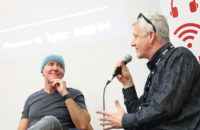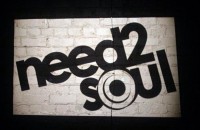A brooding bassline begins as anthemic vocals cry out. “This ain’t the world that I live in/ It’s all wrong.”
No, it’s not a protest song perfectly suited to a Dispatches soundtrack, though it would do the job very well. But it is the intro to the latest long-player from Cursor Miner, aka Robert Tubb. It’s a damn fine, genre-smashingly seamless, 12-track collection that can be appropriated, and interpreted, in many ways.
This forthcoming fourth studio album is like a calling card for Tubb’s madcap musical ethic. There are heavy dubstep influences abound in moments such as The Man With The Transparent Face, which in turn is followed by the blistering beats and bells of Mad Cow– a track so deliciously dark and groovy it should serve to remind everyone why they need breaks in their life. Then there’s the skanking, sub-sinking King Is A Killer, Luna‘s space-age vibe, and the downbeat vocal treat that is Failed State. Oh, and did we mention the ode to overpriced hotel booze, Minibar, which deftly tells the tale of an extinct civilization, brought down by said in-room luxury.
Obviously then, there’s a lot going on. It’s a statement of where the Cursor sound is at now, and represents an evolution that has spanned decades, taking in acid, techno, breaks, drum n bass and anything else sequencers have made speakers spew out since the early days of dance music. In turn it’s earned Tubb a reputation for dazzling life performances at events like BLOC, Glade and Sonar, while providing sounds that nod as much to Depeche Mode as they do Autechre, with DJs like Andrew Weatherall, Dave Clarke and Laurent Garnier all in support. Suffice to say then, we were happy to talk to him.
P&S: So, are you pleased with the new album?
CM: There’s been a four-year gap between this and the last, in which time I’ve pretty much been making random styles. So it was difficult to try and pick out album tracks. Probably about five were obvious, the others were a case of plugging things in, shuffling them about and working out what fit together. I’m still not sure I achieved this 100 per cent, though, as there are lots of right angle turns and weird sort of surprises in there.
“I tried to start it off as if it were a mix, because I think if you’ve got music that’s mainly rhythm people respond well within that. If I put on an album of dance music myself, I prefer it to be mixed as oppose to in individual tracks. Starting out from nothing, going into nothing and then starting out again can get a bit weary I think.”
Four years is a long time in music, how would you like to be perceived by Cursor Miner freshmen?
“I am part of the London dance thing, I suppose, but it’s a bit different because I’m borrowing from a few more places… I think! The whole thing is really about trying to fit as much as possible that I like into one sound.”
You’ve said in the past that breakbeat is at the centre of all modern dance music. Do you feel the same now the scene has dropped off the radar a little?
“It used to be that a breakbeat was really what you had left after everything was removed. People responded to that, and then so much music started to sound like those moments. It’s a little like now, people are listening to things that are much more minimal than before, and now that’s what everything sounds like- that format. But then I often think a lot of my tracks would sound really, really monotonous to someone who had never been in a club atmosphere before- so who knows really.
“You also have the breakbeat scene of 15 years ago, which I think was really about getting away from techno. I’d personally had enough of 4/4 beats, with loops that just go on, and on, and on for ages. Breakbeats are denser, there’s more information, more beats and more funk. It’s what I need, a little more than the basics.”
So you find the way house and techno have gone overly monotonous?
“Well, yeah. They are good in sections, and I still love those sounds, but I can’t go to a night that’s just one kind of music. I’m quite into the dubstep stuff, but I couldn’t go to a full night of it- I think I’d get a bit fidgety after a while. Same with any genre, you know.”
So what kind of dubstep are you listening to? There are more than a few shades of it on the new album.
“Well there’s a really good podcast called Electronic Explorations. He does a lot of dubstep on the more electronica side of things.”
And that’s just one guy?
“Well, he gets guest DJs in to record mixes every week. He churns them out too, so that’s keeping me going at the moment. I listen to a couple of Rinse FM mixes from time to time too, there’s some rude stuff on those.”
Speaking of scenes and their sounds, it doesn’t feel like there’s too much crossover at club nights right now. Any thoughts?
“Yeah, I think it’s kind of because there’s so much out there that people have to shut themselves off a bit. And if you tried to start a night that had no style people would get confused, and so would you- too many options. That said, most of the nights I go to are the one’s I’m playing at, and those seem to be quite eclectic.”
In terms of the nights you’ve played at, there’s a reference to a Soviet bunker on your list of favourites. We presume it was abandoned?
“Ha. Yes, it’s a venue in St Petersburg. It was a nuclear bunker, built when they were throwing them up everywhere, obviously without much optimism for the future. So it’s got these 10″-thick steel doors, and no windows. My friend took me out there, it was pretty anarchic to be honest- people put on events pretty much whenever they can be bothered, which seemed to be most nights.”
A free party vibe then? How often do you hear about stuff like that- minus the military installation- going on in the UK these days?
“Not much. I think I heard about one in London this year, obviously there are loads of squat parties. But it’s different in Eastern Europe and Russia. The amount of time and money they’re willing to invest in nights that they know will make nothing is quite humbling. The weeks of planning, moving soundsystems, generators and anything else they need- it makes me feel pretty lazy for just sitting in a room on a computer making noises.”
Probably less risky though.
“Yeah, probably.”
So what comes after the album?
“I haven’t been making many music plans, as I’m getting ready to start a Masters in DSP, which could be quite hectic.”
Sorry, DSP?
“Music signal processing. The inside of software basically- how stuff works and all that technical business. I’d like to start writing my own software and creating technology.”
Is that because you want more control over how you make your music?
“Yes, and I also enjoy the idea of making stuff for other people to use. Technology is such a big part of everything now that I think it’s possible to influence people by giving them something to make their own stuff, as much as through simply providing them with something to listen to or sample from.”
Interesting. Finally, in terms of music production, what’s good about it in 2010, and what’s bad?
“Probably the exact same thing- there’s so much out there, but it’s all under the radar. If we look hard there’s more good music out now than you could listen to in a lifetime. But music was a lot about bringing people together. Online you can be really specific, which means people aren’t being randomly channeled to anything, so nothing is going to change how they feel about things.”
Cursor Miner’s album, Requires Attention, is released Monday 25th October on Uncharted Audio.









[…] This post was mentioned on Twitter by Martin G Hewitt, Plain & Simple. Plain & Simple said: Who the funk is Cursor Minor? http://goo.gl/fb/WG1Zf […]